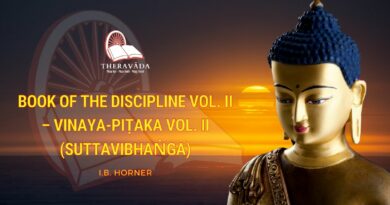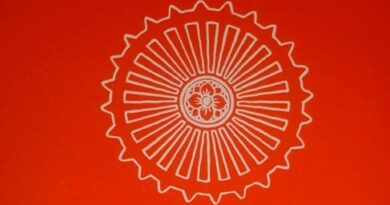Precepts Regarding The Consumption Of Food
Precepts regarding the consumption of food
There are thirty disciplinary precepts concerning the consumption of food.
- Sakkaccan piuaapātan paIiggahessāmīti sikkhā karauīyā.
Food must be accepted with awareness. One should not look away and allow the serving of every kind of food that one will consume as well as those that one will not consume.
- Pattasaññi piudapātam paIiggahessāmīti sikkhā karauīyā.
Pay attention to the bowl when receiving food. If food is consumed in a vessal other than a bowl, attention must be paid to such vessal. Do not receive food carelessly, looking here and there.
- Samasūpakan piuaapātam paIiggahessāmīti sikkhā karauīyā.
Only the adequate quantity of Sūpa (auxiliary food), to match the quantity of rice must be accepted. Sūpa here are dishes made of pulses such as green gram, beans, gram and lentils, that are prepared to be solid enough to be picked up with the fingers. Such curries must be only quarter of the quantity of rice. It is an offence to accept any more. Other curries may be accepted in any desired quantities. Accepting excessive quantities from relatives and kappiyās is not an offence. Accepting on behalf of another or acquiring with one’s own wealth is not an offence.
- Samatittikan piuaapātan paIiggahessāmīti sikkhā karauīyā.
Food must be accepted only upto the lower brim of the bowl. Accepting food to be at a level higher than the rim is an offence. Even if the level is higher than the rim at the time of acceptance, if it will settle at a level below the brim, there is no offence commited. This precept is concerning a bowl suitable for determination. When accepting food into a smaller bowl not suitable for determination or another vessal filling above the brim is not an offence. Food served on a paper/leaf or another vessal kept on top of the rice, to reach a level higher than the rim may be accepted.
These are not offences for the sāmaneras. They become offences only for the higher ordained bhikkhus. Following disciplinary precepts if broken by sāmaneras do require punishment.
- Sakkaccan piuaapātan bhuñjissāmīti sikkhā karauīyā.
Food must be consumed with conscious attention to it. Consumption of food must not be done palyfully and carelessly.
- Pattasanññī piudapātam bhuñjissāmīti sikkhā karauīyā.
Food must be consumed with conscious attention to the bowl. It is an offence to consume food looking around disrespectfully.
- Sapadānan piuaapātan bhuIjissāmīti sikkhā karauīyā.
Food must be taken in a methodical manner and not from random points in the vessal.
- Samasūpakan piuaapātan bhuIjissāmīti sikkhā karauīyā.
Pulses are to be consumed proportionately to the rice. Consuming a lot of pulse disrespectfully is an offence. It is not an offence for those who have difficulties in consuming food to do so in any manner that they desire.
- Na thūpato omadditvā piuaapātan bhuñjissāmīti sikkhā karauīyā.
Mixing food at the top and consuming it should not be done. Consumption must be done beginning at one end. It is not an offence to mix everything and consume, when only a small quantity of food is left.
- Na sūpan vā byañjanan vā odanēna paIicchādessāmī bhīyyokamyatan upādāyāti sikkhā karauīyā.
Curries should not be covered with rice in order to obtain more curries. It is not an offence to consume what has been covered by those who served the food.
- Na sūpan vā odanan vā agilāno attano atthāya viññāpetvā bhuñjissāmīti sikkhā karauīyā.
Anyone who is not ill should not ask for rice or curries for consumption. It is not an offence to ask for the use by another. It is also not an offence to ask from relatives or kappiyās. It is also not an offence to ask for anything prepared by using one’s own wealth. It is indecent to ask laypeople to bring specific items of food. Therefore, one must get used to be satisfied with whatever is offered by the lay people.
- Na ujjhānasaññi paresan pattan olokessāmīti sikkhā karauīyā.
One should not look at another’s bowl with intent to insult. It is not an offence to look with the intention of giving whatever is short or get someone to offer some.
- Nātimahantan kabalan karissāmīti sikkhā karauīyā.
It is not proper to consume large lumps of rice. “Mayūracaam atimahantan kukkuiacaam atikhuddakan tesam vemajjhappamāno”. Peacock egg is very large, fowl egg is very small; vinaya commentaries show that a lump of rice in between these two in size is sufficient. Therefore, medium sized lumps should be consumed.
- Parimaudalan ālopan karissāmīti sikkhā karauīyā.
Perfectly spherical lumps should be made and consumed. Long lumps of rice should not be consumed. It is not an offence to do so by mistake. It is an offence to do so due to lack of care.
- Na anahaIe kabale mukhadvāran vivarissāmīti sikkhā karauīyā.
The mouth should not be opened before the lump of rice reaches the mouth.
- Na bhuñjamāno sabban hatthan mukhe pakkhipissāmīti sikkhā karauīyā.
When cosuming food, the whole hand should not be entered into the mouth.
- Na sakabalena mukhena byāharissāmīti sikkhā karauīyā.
One should not speak with food in the mouth. This precept is broken by speaking with so much food in the mouth, that the words cannot be properly pronounced. It is not an offence to speak with a small quantity of food in the mouth that would not obstruct speech.
- Na piudukkhepakan bhuIjissāmīti sikkhā karauīyā.
Food should not be consumed by tossing it into the mouth.
- Na kabalāvacchedakan bhuñjissāmīti sikkhā karauīyā.
Lumps of rice must not be bitten at when consuming food. It is not an offence to do so with sweetmeats and fruits.
- Na avaganaakarakan bhuñjissāmīti sikkhā karauīyā.
Food should not be stuffed between the jaws and eaten as done by monkeys. It is not an offence to consume fruit in this manner.
- Na hatthaniaūnakam bhuñjissāmīti sikkhā karauīyā.
Food must not be consumed while shaking food off the hand. It is not an offence to shake the hand to throw away dirt and rubbish.
- Na sitthāvakārakan bhuñjissāmīti sikkhā karauīyā.
Grains of rice should not be thrown about while consuming food. Bhikkhūs should get used to consuming food without spilling even a single grain of rice. It is not an offence if some grains of rice are spilled while removing rubbish.
- Na jivhānicchārakam bhuñjissāmīti sikkhā karauiyā.
Tongue should not be put out while consuming food.
- Na capucapukārakan bhuñjissāmīti sikkhā karauīyā.
Should not make a noise while consuming food.
- Na surusuru kārakan bhuñjissāmīti sikkhā karauīyā.
Sucking noise as “surusru” should not be made while consuming food. Some people make such a sucking noise when drinking things such as gruel and milk. It should not be done.
- Na hatthanillehakan bhuñjissāmīti sikkhā karauīyā.
Fingers should not be licked when consuming food. It is an unpleasant sight for bystanders.
- Na pattanillehakan bhuñjissāmīti sikkhā karauīyā.
One should not scrape the bowl with the fingers and eat.
- Na oIIhanillehakan bhuñjissāmīti sikkhā karauīyā.
When consuming food one should not lick the lips.
- Na sāmisena hatthena pānīyathālakan paIiggahessāmīti sikkhā karauīyā.
One should not accept a water container with a hand soiled with food. If a part of the hand is soiled, it is not wrong to accept with another part of the hand. Accepting for washing is not an offence.
- Na sasitthakan pattadhovanan antaraghare jaaaessāmīti sikkhā karauīyā.
Water containg grains of rice, from washing the bowl should not be thrown in the inner village. It is not an offence to throw it after separating or dissolving the grains of rice. Discarding into a vessal kept for collecting wash water is not an offence.
These precepts must be observed to develop ways of consuming food in a disciplined manner that would not cause unpleasentness and revulsion to the bystanders and other bhikkhus partaking of food. The eating area should not be dirtied by spilling water, rice, curries, bones and skins. One should not accept food in quantities greater than is required. Items such as curd must be consumed without making a clattering noise with the spoons. Noises from clearing the throat and blowing the nose which result in unpleasentness to others should not be made. One should not ask for specific things to be brought.




